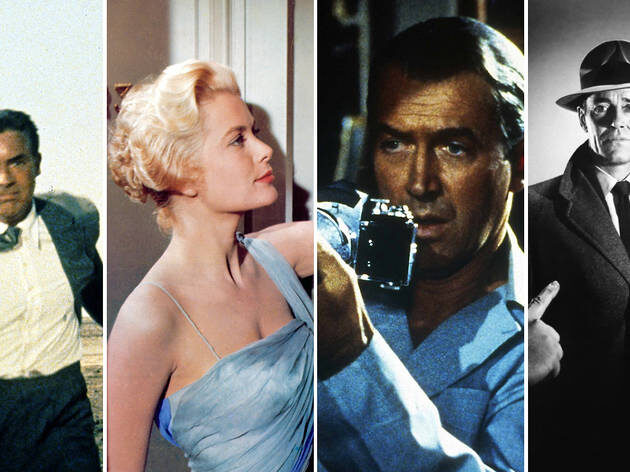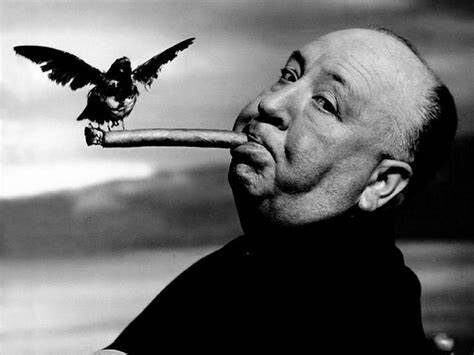Alfred Hitchcock, the master of suspense and psychological thrillers, is as popular today as he was in his heyday. Dial M for Murder, To Catch a Thief and Rear Window are a few of his classics. Here’s a look at the legendary directors career that spanned six decades.
Hitchcock’s early years
Born in 1899, the youngest of three children, he spent his formative years attending St. Ignatius College. He left the school at 14 after his father passed away and studied at the London County Council School of Engineering and Navigation becoming a draftsman and advertising designer after graduating.
Being intrigued with photography his life took a turn that led to working as a title card designer for a company that would eventually become Paramount Pictures. In 1920 Hitchcock was successful in acquiring a full time position with Islington Studios. Within five years he went from title designer to director. By the late 30s he was regarded as one of England’s most famous filmmakers. He possessed a natural, brilliant talent for mixing subtle, sexual tension with gripping suspense and his famous black humour.
The 40s – Hitchcock’s introduction to Hollywood
In March of 1939 Hitchcock moved his wife, Alma, and daughter, Patricia, to the US. His first American directorial debut was Selznick’s film, Rebecca in 1940. Although it was a hit winning two Oscars, in 1962 Hitchcock was quoted as saying ‘(Rebecca) is not a Hitchcock picture.’ The two men clashed over almost every aspect of the film during shooting.
Hitchcock’s first big hit and second film, Foreign Correspondent, was released hot on the heels of Rebecca, even though it was finished prior to the former’s debut. This effort was the first introduction of his unique style of filmmaking and directing.
Always a man to delve into the psychodynamics of the human mind his films were speckled with exploration of the correlation between sex and violence, and the malevolence that is sometimes present in domestic sectors of life. This exploration was evidenced in the making of Suspicion (1941) and Shadow of Doubt(1943). Both films were a study of the corruption of family life using not only physical force, but contrived emotional abuse. His success continued throughout the late 40s with classics like Spellbound, Notorious and The Paradine Case.
Hitchcock in the 50s
By the 50s Hitchcock had ensconced himself in the director’s chair producing some of his best films. Dial M for Murder, To Catch a Thief, and Rear Window, all starring the late Grace Kelly, continue to memorize audiences with their sophisticated take-your-breath-away suspense and the edgy, sexual innuendos that became one of Hitchcock’s trademarks.
North By Northwest is perhaps one of his more recognized films from this era. Roger Thornhill, portrayed by the late Cary Grant, is wrongfully accused of being a double agent and an assassin. The movie is a thrill a minute ride right to the end, featuring a heart pounding chase by a crop duster and a nail biting climb down Mt. Rushmore. Its said that as a youth Hitchcock was sent by his father to local police along with a note requesting he be locked up for apparent bad behaviour. This type of harsh treatment and wrongful accusation became a common thread in his films.
Spine-tingling films from the 60s
Hitchcock’s now infamous film, Psycho (1960), retains the ability to terrify viewers to this day. As with his father’s actions toward him, it is also believed that his mother’s unusual punishment of making him stand at the foot of her bed for hours was depicted in his films. The impact of this early experience is said to have contributed to developing the character of Norman Bates.
Apparently, following Psycho’s release an irate father of a young girl sent Hitchcock a letter in which he stated his daughter refused to bathe after seeing Diabolique and was adamant on not taking a shower after watching Psycho. Hitchcock, with his wry humour, replied, ‘Send her to the drycleaners.’
During the 60s he went on to direct other classics (also produce some titles) including The Birds (1963), Marnie (1964) and Torn Curtain (1966).
The final curtain
Family Plot (1976) was a light-hearted suspense and was to be the last film from this incredibly talented man. Hitchcock passed away April 29, 1980, but his face will be remembered eternally thanks to his quirky, often humorous, cameo appearances in every film he directed.
- How to support your child’s mental health: A parent’s guide - February 1, 2025
- Can data centers stay green? Balancing digital growth with clean energy - January 26, 2025
- Why Blockchain could be end of high fees, delays in global payments - January 17, 2025
- Abridge AI: Silent scribe transforming healthcare interactions - January 5, 2025
- What makes quantum AI a game-changer for technology - December 25, 2024
- How businesses must adapt to evolving cyber threats in 2025 - December 4, 2024
- How vaping stiffens blood vessels and strains lungs: Study - November 26, 2024
- OpenAI Codex or Google Codey? Finding the perfect AI for your code - November 18, 2024
- What Google’s Project Jarvis means for future of digital interaction - October 28, 2024
- 11 tips for creating engaging ad content - July 8, 2024





